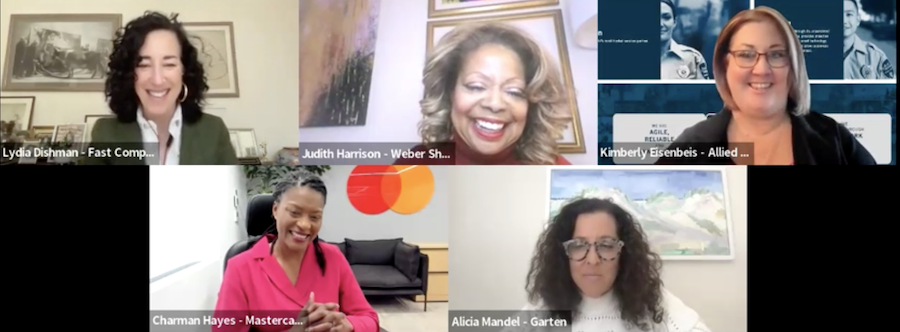Cultivating Well-Being Through Workplace Culture


“Being able to support our employees’ mental health in multiple ways is probably one of the most important things that we can do,” said Judith Harrison, chief diversity, equity and inclusion officer for Weber Shandwick. Nearly 75% of American workers are moderately or highly concerned about workplace well-being, according to a recent study.
The report also found the same percentage of workers had a similar level of concern about their own emotional well-being or mental health. Harrison and a panel of other leaders spoke on this subject in a session titled “Cultivating Well-Being Through Workplace Culture,” during From Day One’s January virtual conference.
Another panelist, Charman Hayes, executive vice president of people and capability technology at MasterCard, told moderator Lydia Dishman that it’s essential for companies to take a holistic approach to their employees’ well-being. She said this approach addresses the mind, body, financial security, and the social aspects of workers’ lives, which encompasses inclusion.
“Those four pillars are really important to MasterCard in terms of how we want our employees to be their best selves,” Hayes said. “We listen. We are constantly doing employee pulse surveys to understand what’s on people’s minds.”
Kimberly Ardo-Eisenbeis, vice president of HR and recruiting for Allied Universal Security, said that in a post-pandemic world, many workers are focused on their ability to bring their whole selves to work.
“Some of that has been mental health-tied, but some of it is just being free from the burdens of financial stressors, environmental stressors, and the ability to find the things that are important to them,” she said.
Allied is focused on creating an environment where employees feel comfortable taking advantage of resources offered by the company, whether it is mental health or financial assistance, says Ardo-Eisenbeis.
“It really comes down to feeling that there’s a safe place, removing the shame of asking for help, removing the risk of being seen as less than in anybody’s eyes,” she said.
Flexibility in the Workplace
Alicia Mandel, chief human resources officer at Garten, said for her the most important thing for her personal well-being is flexibility.
“During Covid everybody was very flexible. And then it seemed that flexibility went out the door suddenly. So, my personal thing is, how do we create a workplace that is still flexible enough to give people the peace of mind that they need and still perform?”
Mandel said Garten is committed to maintaining a fully remote workforce even after the pandemic to give employees some flexibility. However, working from home can cause workers to feel isolated and lonely. Therefore, the company tries to bring people together once a quarter “to give them a chance to break bread together, to go play a game or do a thing.”

Hayes said as a mother of two school-age children, “what really thrills me is that I have flexibility through MasterCard. I’m able to come into our tech hubs around the world to work a few days a week and also work remotely where I need to.”
This flexibility also allows Hayes to maintain a healthy lifestyle. For her, this includes having time to walk, go to the gym, prepare nutritious meals, and being centered mentally.
“And then the last thing that’s extremely important to me has kept me through the past few years in my happy and healthy mantra is committing to the community,” Hayes said. “I’ve been able to do volunteer days with my family, bringing my children along to several nonprofit agencies in New York City to help and contribute to the community.”
Providing Financial Security for Workers
Two years ago, MasterCard conducted a study to see how employees felt about the rewards and benefits packages the company offered and did a listening tour to get feedback.
“After that listening tour, we had a very good understanding of what our employees wanted, more of what they appreciated, what they valued,” Hayes said. “And that gave birth to our approach to financial wellness and financial fitness.”
Workers not only want a competitive base and bonus pay, but also the ability to save for retirement and other goals, such as buying a house or sending their children to college, according to Hayes. She noted MasterCard offers a retirement plan with a 10% employer match and one-on-one financial consulting through an outside vendor.
“What I appreciate most about the benefit investing is that it’s not bespoke to any one scenario,” Hayes said. “We recognize that colleagues have very different scenarios and are on very different journeys with different goals and objectives.”
The Role of DEI
There’s been a recent pushback against DEI policies and initiatives in workplaces, but DEI is essential, says Harrison.
“DEI covers the waterfront in terms of well-being, creating a connected community in which people are encouraged to bring their authentic selves to work, and encouraging others to understand who they are,” she said.
The sponsorship program at Weber Shandwick, in which senior leadership mentors promising employees, “has been a game-changer for us,” Harrison said. “There’s nothing like giving underrepresented people the opportunity to connect with executives that they would never have met in any other way.”
Mary Pieper is a freelance reporter based in Mason City, Iowa.
The From Day One Newsletter is a monthly roundup of articles, features, and editorials on innovative ways for companies to forge stronger relationships with their employees, customers, and communities.